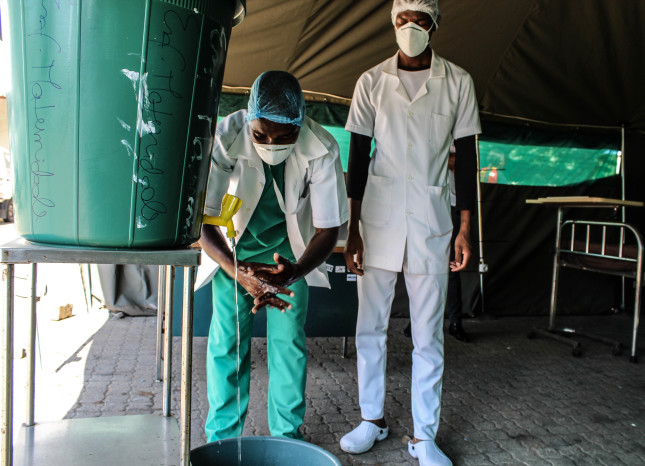-
Covid-19 // Dot-Mom // On the Beat
The Great Disruptor: COVID-19 Threatens Essential Health Services for Women and Children
July 1, 2020 By Deekshita Ramanarayanan
“The world is at risk of losing millions of women and children due to reductions in coverage of essential services, reversing hard-earned progress towards the SDGs [Sustainable Development Goals] to date and posing catastrophic consequences for households and communities,” said Dr. Koki Agarwal, Project Director of the United States Agency for International Development’s (USAID) MOMENTUM Country and Global Leadership award, at a recent event on the importance of ensuring continuity of maternal, newborn, and child health services, voluntary family planning, and reproductive health care during the COVID-19 pandemic. The event was the first in a series of virtual country knowledge exchange discussions organized by USAID’s MOMENTUM Country and Global Leadership, led by Jhpiego and partners.
“COVID-19 is causing a disruption of essential healthcare, including antenatal care, facility-based delivery, immunization programs, and voluntary family planning,” said Kerry Pelzman, Deputy Assistant Administrator of the Bureau for Global Health at USAID. Early estimates of the indirect effects of COVID-19 show devastating impacts for maternal and child health, said Dr. Tim Roberton, Assistant Scientist in the Department of International Health at the Johns Hopkins Bloomberg School of Public Health. Due to the pandemic, there is a reduced availability of health workers, supplies, and equipment, while simultaneously a higher demand for health services. This disruption heightens risks, leading to a potential increase in maternal mortality of 8 to 39 percent and in child mortality of 10 to 45 percent. Within six months, the world could see up to an additional 57,000 maternal and 1.2 million child deaths, said Roberton.
In previous infectious disease outbreaks like Ebola and SARS, existing health services were significantly compromised, said Dr. Meseret Zelalem, Director of Maternal and Child Health and Nutrition at the Federal Ministry of Health in Ethiopia. “In particular, COVID-19 has underscored the critical need for water, sanitation, and hygiene, or WASH, in health facilities and infection prevention and control [IPC] in order to deliver care for women and children safely and to sustain communities’ trust in the healthcare system,” said Pelzman. While Tanzania did not implement a lockdown, there was a country-wide emphasis on WASH and IPC, said Dr. Ahmad Makuwani, Assistant Director of Reproductive and Child Health in the Tanzania Ministry of Health. This, in addition to closing academic institutions, ensured patients could visit health facilities while still preventing the spread of COVID-19.
In Ethiopia, IPC has been crucial for maintaining vital health services, said Zelalem. Ethiopia’s Ministry of Health has monitored related outbreaks and emphasized frequent communication to help manage essential service continuation. India has seen a drastic reduction in maternal and newborn health and family planning services, said Dr. Bulbul Sood, Country Director of Jhpiego India. India’s health facilities have also emphasized IPC, as well as community level options with frontline health workers, in order to continue providing high-quality health services.
In addition, India has prioritized telehealth interventions and self-care practices, such as home pregnancy tests, to minimize the need to visit a health facility. Similarly, health officials in Ethiopia have emphasized self-care approaches like maternity care kits, digital resources, and the distribution of misoprostol to prevent hemorrhage. Tanzania’s self-care approach addresses reproductive, maternal, and newborn health, including WASH and IPC. The Tanzanian government, said Makuwani, has worked to make sure handwashing stations or sanitizer are available in households and popular shops to ensure protections for all community members.
The importance of collaboration between government agencies and community health workers was a consistent theme across the panelists’ remarks. The success of the newly implemented interventions in India, Tanzania, and Ethiopia are only possible through consistent and transparent collaboration between government leaders, civil society, community organizations, and frontline health workers. Additionally, knowledge-exchange opportunities like this webinar series promote collaboration between countries. The value of this was made clear when each panelist was able to point to one intervention shared that they would take home to their own COVID-19 response – leveraging a digital platform, addressing larger populations in lockdown at home, and preventing and identifying gender-based violence.
Sarah B. Barnes, Project Director of the Maternal Health Initiative and Women and Gender Advisor at The Wilson Center, moderated this event.
Photo Credit: Fernando Fidélis/Jhpiego
 A Publication of the Stimson Center.
A Publication of the Stimson Center.



